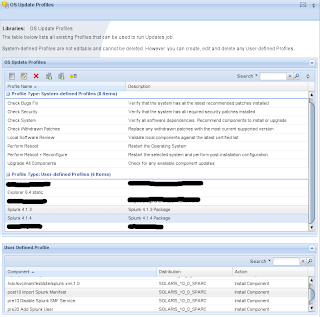Package Deployment with OpsCenter
There has been some discussion on Constantins blog about working around IPS' scripting limitations.
I don't want to talk about the reasons, why IPS does not have classical pre/postinstall-scripts, but I want to demonstrate how this functionality could be achieved with Oracle's Enterprise Manager OpsCenter.
If you don't know OpsCenter, it's _the_ management tool from Oracle for Solaris, Unbreakable Linux and OracleVM.
OS Updates
In OpsCenter terminology Package deployments are called "OS Updates". OS Updates consist of Update Components (Packages, Patches and Configurations), Update Policies and Update Profiles. If an OS is to be updated, so called "Update Profile"-jobs will be sent to hosts run.
Update Profiles
There are two types of Update Profiles, System-defined and User-defined. What we're looking for are user defined profiles. A user-defined profile contains components. These components can be Packages, Pre/Postinstall-Scripts and Configuration files.
They can also contain macros to be run on the target system to return information about the system. This information can then be used to dynamically create a configuration file.
It is also possible to run probes, to check if pre-requisites are met.
Update Profiles can also contain other update profiles. (e.g. to create a Mail-Server profile or Web-Server profile)
In the picture we can see two Splunk Profiles. Below you can see some components, like the SMF Manifest or a postinstall script.
Update Components
Update components are organised into folders:
Configuration Files carry a version number.
Uploading configuration file (-templates) or scripts is simple:
Running OS Update Job
It is easy to run update jobs on one or several hosts. There are different options that can be set how to run the jobs...
While the job is running and after it's finished the job details can be monitored. Of course it makes sense to have good error handling in the pre/postscript.
Summary
The examples shown are with SysV packages, as OpsCenter for obvious reasons lacks IPS support at the moment. But it shows how scripts can be run before and after package installation. As an alternative to OpsCenter, the same can be achieved using e.g. Puppet, bcfg2 or cfenginge.
The nice thing about using a management tool is, to compare different systems, find differences and keep them standardized.
I don't want to talk about the reasons, why IPS does not have classical pre/postinstall-scripts, but I want to demonstrate how this functionality could be achieved with Oracle's Enterprise Manager OpsCenter.
If you don't know OpsCenter, it's _the_ management tool from Oracle for Solaris, Unbreakable Linux and OracleVM.
OS Updates
In OpsCenter terminology Package deployments are called "OS Updates". OS Updates consist of Update Components (Packages, Patches and Configurations), Update Policies and Update Profiles. If an OS is to be updated, so called "Update Profile"-jobs will be sent to hosts run.
Update Profiles
There are two types of Update Profiles, System-defined and User-defined. What we're looking for are user defined profiles. A user-defined profile contains components. These components can be Packages, Pre/Postinstall-Scripts and Configuration files.
They can also contain macros to be run on the target system to return information about the system. This information can then be used to dynamically create a configuration file.
It is also possible to run probes, to check if pre-requisites are met.
Update Profiles can also contain other update profiles. (e.g. to create a Mail-Server profile or Web-Server profile)
In the picture we can see two Splunk Profiles. Below you can see some components, like the SMF Manifest or a postinstall script.
Update Components
Update components are organised into folders:
Configuration Files carry a version number.
Uploading configuration file (-templates) or scripts is simple:
Running OS Update Job
It is easy to run update jobs on one or several hosts. There are different options that can be set how to run the jobs...
While the job is running and after it's finished the job details can be monitored. Of course it makes sense to have good error handling in the pre/postscript.
Summary
The examples shown are with SysV packages, as OpsCenter for obvious reasons lacks IPS support at the moment. But it shows how scripts can be run before and after package installation. As an alternative to OpsCenter, the same can be achieved using e.g. Puppet, bcfg2 or cfenginge.
The nice thing about using a management tool is, to compare different systems, find differences and keep them standardized.








Comments
Gruß
Kannst Du mir noch Deine Kontaktdaten im Kommentar zukommen lassen?
(Werde den Kommentar nicht veröffentlichen)